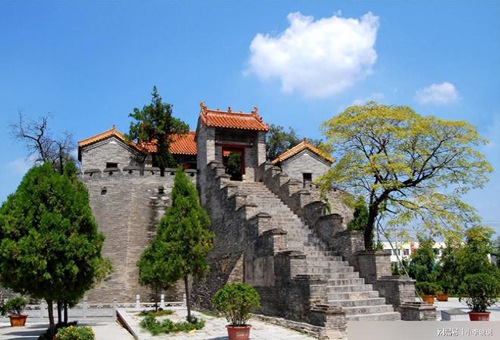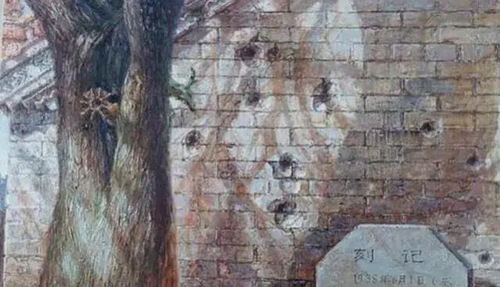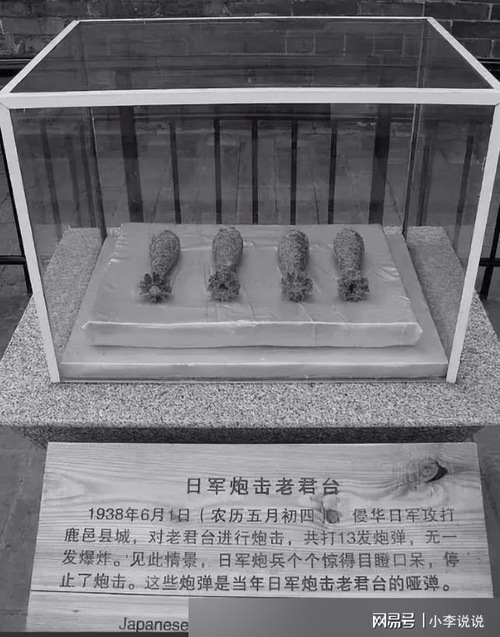(Minghui.org) When clarifying the truth, we sometimes come across people who have lost their faith in the divine and now place their faith in science. However, there are many stories related to divine beings that science cannot explain. Below is one such story.
After the Japanese army invaded China in 1937, a troop of soldiers went from Bozhou City in Anhui Province westward to Luyi County in Henan Province. On June 1, 1938, soldiers were stationed in a village about 1.5 kilometers (one mile) from the capital of Luyi County. The soldiers could see two tall structures in the city, one on the northeast corner and another on the southeast corner. They assumed these structures were military fortifications and decided to destroy them. A gunner, Umekawa Taro, demolished the structure on the southeast corner (Kuixing Tower) with one shot. After lobbing several rounds of artillery at the structure on the northeast corner, however, none of them detonated.
The gunner fired at the inner city to ascertain that there was nothing wrong with the shells, and the shell exploded as expected. But when he fired at the northeast corner structure, the shell again failed to detonate. After 12 artillery shells failed to explode, the squad leader tried one more time, and that one didn’t detonate, either.
Statistically Impossible
When they entered the capital city, the Japanese soldiers saw a statue of Lao Zi on the terrace of the city’s main hall. Some said the place was likely protected by the deities the Chinese had worshiped They knelt down in front of the statue and apologized for trying to destroy the structure.
 The terrace of Lao Zi in Luyi County, Henan Province
The terrace of Lao Zi in Luyi County, Henan Province
Lao Zi is said to have lived in Luyi County for many years. The terrace was built during the Song Dynasty at the place where Laozi became immortal. With a base of 765 square meters (8,200 square feet), the terrace was 13 meters (43 feet) high with 33 steps. In addition to a bronze statue in the main hall, there are also inscriptions, iron pillars, and other objects of worship in the courtyard.
 Drawing shows the shell holes left on the east side wall and a tree trunk.
Drawing shows the shell holes left on the east side wall and a tree trunk.
The shells hit the east side of the main hall and the back wall of the side hall on the east. One of the shells lodged in a cypress tree trunk and two went through the wall: one was lodged between the roof beams and the other landed on the shrine in front of Lao Zi’s statue. When maintenance was done on the southwest corner in 2003, workers dug out a rusty shell and detonated it. By then, all 13 shells had been located. There were two small halls behind the main hall, one of which was filled with black gunpower by the defending army at the time. Had one of the shells detonated it, the consequences would have been unimaginable.
 Unexploded shells from the Japanese army in 1938
Unexploded shells from the Japanese army in 1938
Statistically, it would be almost impossible for all 13 shells to fail to detonate. For example, let’s say the probability of one shell exploding is 80% (a failure rate of 20%). The probability of two shells failing is 0.2 x 0.2 = 0.04, and the probability of all 13 shells failing is 0.2^13=0.00000000082 (or 8.2^(-10)). That is, almost impossible.
Thinking Outside the Box
Many things that happen cannot be explained by modern science. For example, what is the chance of a desert flooding? But this happened more than once in China’s Taklamakan Desert in 2021 and 2022. Typhoons that normally only occur in south China also caused major damage in the northeast.
There were many such stories in the past, from the destruction of Sodom and Gomorrah in the Bible to the city of Pompeii being buried by volcanic ash. When mankind becomes morally corrupt, many things can be destroyed, including a civilization. Although modern science cannot explain these things, we know the saying “You reap what you sow.” A similar expression in Chinese is “Good is rewarded with good, and evil incurs evil.”
These examples from history show us the importance of following our principles and conscience, just as Falun Dafa practitioners have been doing in China. Despite the harsh persecution by the Chinese Communist Party, they have stayed faithful to the principles of Truthfulness-Compassion-Forbearance, with no hesitation or regret, for the past 25 years, because they know this is the right thing to do.
Views expressed in this article represent the author's own opinions or understandings. All content published on this website are copyrighted by Minghui.org. Minghui will produce compilations of its online content regularly and on special occasions.








